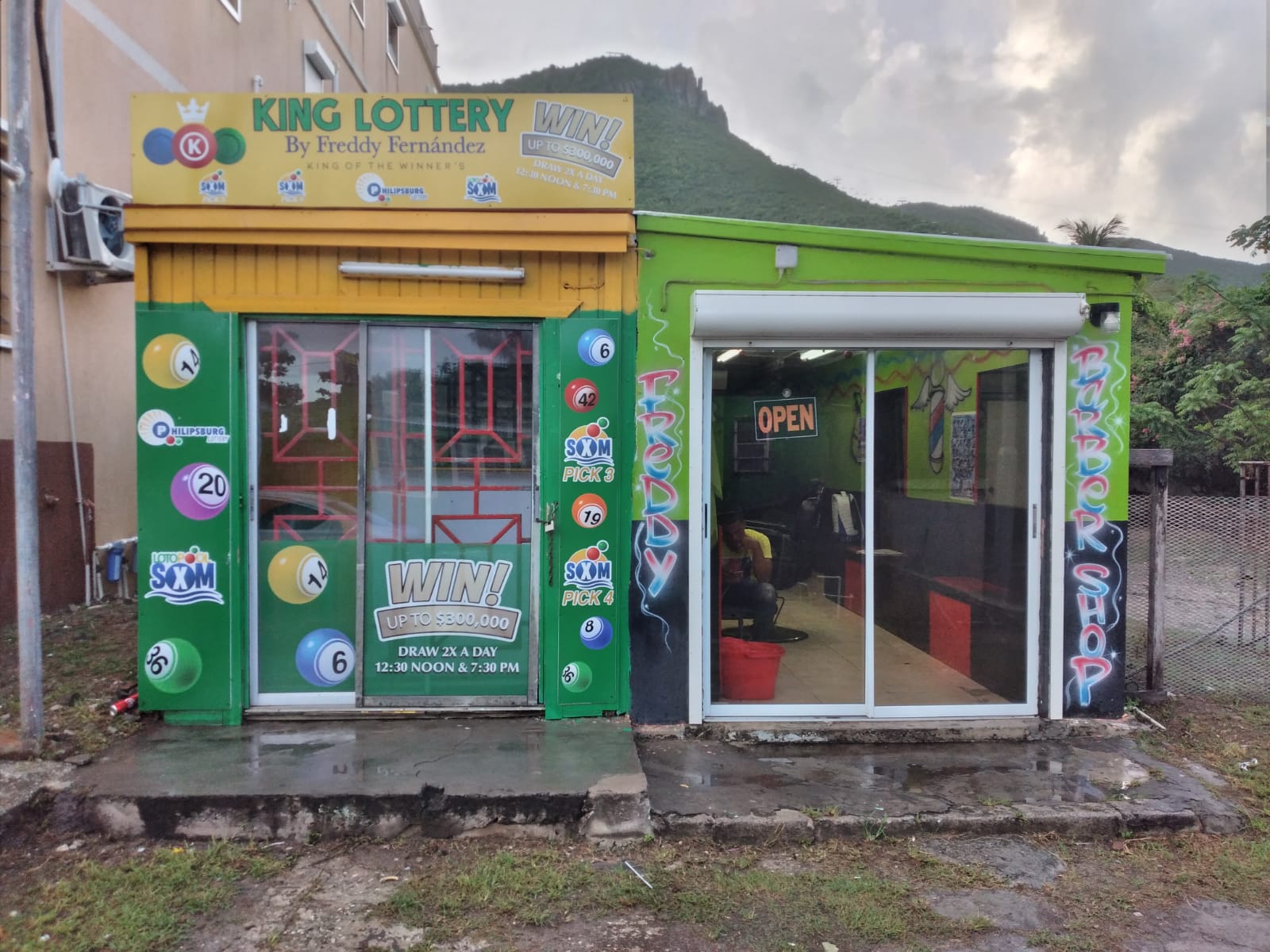Lottery booths target low-income areas

PHILIPSBURG — There are 360 lottery venues in St. Maarten per February 2021, according to a study by the Social Economic Council (SER). That is, assuming population of 40,000, one booth for every 111 inhabitants. Most lottery booths are concentrated in low-income areas – because that is where the clients are.
The SER-study focuses on the impact of these lottery booths on low-income areas. St. Maarten has three times as many lottery booths as Curacao and they outpace casinos by 8 to 1.8.
The study recommends that lottery booths should not be outside a radius of one hundred meters from schools, hospitals, clinics, churches, banks and rehab centers. With some bravado, the report announces that is a proponent of a ban on selling lottery tickets to vulnerable people and gambling addicts.
Party for Progress leader Melissa Gumbs was the first to sound the alarm about the lottery booths. In October 2020 she asked for a study into this issue. It took Prime Minister Silveria Jacobs almost twenty months before she finally sent a request for the study to the SER.
The report makes in one sentence clear what the attitude of the government is towards gambling – because that’s what buying lottery tickets is. Since 1995, the report states, there are no viable data about gambling addiction in St. Maarten. So the government does not know just how bad things are, or it chooses to ignore the issue.
The Belgian website Health and Science estimates that 1 percent of the population has a gambling addiction and that another 3 percent has a problem with gambling. American data suggest a lower prevalence of gambling addiction: between 0.2 and 0.3 percent. Projected on St. Maarten’s population this suggests that there are between 80 and 400 gambling addicts on the island and that up to 1,200 citizens have a problem with gambling.
The Dutch Agog Foundation provides help to problem-gamblers and to people who have problems with the gambling behavior of someone they love. It identified the factors that motivate people to gamble. The top two are relaxation (64%) and a desire to become rich fast (60%). At the bottom of the list are relationship-related problems with 40 percent.
The Jellinek clinic, an institution that treats addiction, says on its website that there are 8 million recreational players of games of chance in the Netherlands; 95,700 players are labeled as ‘at risk’ and 79,000 as ‘problem players’. Both groups are most likely addicted to gambling, the clinic observes. Of the 79,000 players it considers addicts just 2,186 (2.7 percent) are undergoing treatment.
Lotteries have been around like forever and the Dutch were ahead of the curve with the first draw for its national lottery in 1726. In 2016 the Dutch Lottery was born: a merger of the state lottery and the Lotto. This organization also offers games of chance under seven other names.
The organization encourages people to play: “All of the Netherlands wins” it declares on its website. To emphasize its social responsibility it furthermore states: “We execute the Dutch policy on games of chance. That is our societal task – always based on consumer protection, the prevention of addiction and combating fraud and criminality.”
The numbers tell a different story. In 2021 the lottery-organization paid out €2.5 billion ($2.7 billion) in prize money; it furthermore donated €50.4 million ($54.4 million) to sports association, €19.2 million ($20.7 million) to 18 different charitable organizations and €118.4 million ($127.9 million) to the state.
There is no doubt that lotteries are big business. The scale on St Maarten may be smaller, but the impact on individual players can still be devastating. That is because the lottery mechanism is simple: somebody has to lose, for somebody else to win. And winning a lottery is not easy, or maybe it is more correct to say: virtually impossible.
In a numbers game where you have to guess 6 out of 49 numbers correct, chances that you achieve this are around 1 in 13.9 million. In the American Mega Million multi-state lottery the odds are astronomical: 1 in almost 176 million.
According to the National Weather Service your are about 20,000 times more likely to get hit by lightning over the course of your life than you are to win the Mega Millions jackpot.
The odds of winning big with scratch lottery tickets in St. Maarten are unknown because the number of tickets is not mentioned and it is also unknown whether the biggest prizes are still in the mix.
As an alternative, wonderopolis.org has some sound advice: if you spend $150 a year on lottery tickets now, consider investing it against an 8 percent return. Over forty years that will generate a capital of $38,000 – a sure winner.
###
Related articles:
Opinion piece: Why you should avoid lotteries
March is Gambling Awareness Month — TURNING POINT FOUNDATION
Banks kick lottery companies out
De-risking strategy targets casinos and lottery companies
Court denies Smartplay right to text message lottery


























